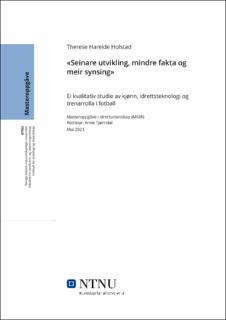| dc.contributor.advisor | Tjønndal, Anne | |
| dc.contributor.author | Holstad, Therese Hareide | |
| dc.date.accessioned | 2023-07-20T17:20:58Z | |
| dc.date.available | 2023-07-20T17:20:58Z | |
| dc.date.issued | 2023 | |
| dc.identifier | no.ntnu:inspera:138967549:96841831 | |
| dc.identifier.uri | https://hdl.handle.net/11250/3080599 | |
| dc.description.abstract | Denne masteroppgåva handlar om kva kjønna betydingar innføring av idrettsteknologi får for trenarrolla i fotball. Problemstillingane som vert utforska er: (1) Kva erfaringar har fotballtrenarar for kvinne- og herrelag med teknologiske hjelpemiddel?, og (2) Kva kjønna betydning får ulik tilgang til teknologi for fotballtrenarar for kvinne- og herrelag?
Studien basera seg på kvalitative intervju der seks fotballtrenarar for kvinner og seks fotballtrenarar for menn, på breidde- og toppnivå har blitt intervjua. Datamaterialet er tolka i lys av tidlegare forsking på idrettsteknologi og trenarrolla. Vidare blir feministisk teori om kjønn og teknologi nytta. Her er den sosialkonstruktivistiske kjønnsforståinga til Haavind (1994) sentral, samt feministisk teori om teknologi (Wajcman, 2010) og det digitale skilje (Cooper, 2006). Delar av analysen bygger også på omgrep om kvantifisering og vitskapleggjering av idrett.
Hovudfunn i oppgåva er sentrert rundt fire hovudtema: (1) kva idrettsteknologiske verktøy brukar fotballtrenarane?, (2) økonomi som rettferdiggjering for ulik tilgang til teknologi i kvinne- og herrefotball, (3) kjønna betydningar av teknologi i fotball og (4) utviklinga av idrettsteknologi og trenarrolla i framtida. Gjennom studien kjem det fram at trenarane for kvinne- og herrelag brukar ganske like typar idrettsteknologi, som kroppsnær teknologi og overvakingsteknologi. Samtidig er idrettsteknologi kostbart, og økonomi blir ei stor barriere for kvinnefotball. Det fører til at kvinnefotball har færre og mindre teknologiske verktøy enn herrefotball. Sidan herrefotball har meir ressursar, blir økonomi brukt til å rettferdiggjere ulik tilgang til teknologi der trenarane for mannlege lag har få refleksjonar rundt kjønna betydningar av teknologi i fotball.
Analysen viser at tilgang til mindre og dårlegare teknologi får betyding for kvinnefotball generelt, og trenarrolla spesielt. Sidan kvinner i hovudsak berre trenar kvinner, vil tilgang på mindre teknologi særleg gå ut over kvinnelege trenarar. Tilgang til mindre teknologi kan påverke kvinnelege trenarar si idrettsfaglege utvikling, og forsterke stereotypiske haldningar om kompetansen til kvinner i trenaryrket. Samla sett vil ulik tilgang til teknologi i fotball kunne føre til konsekvensar for fotballtrenarar for kvinnelege lag, og særleg kvinnelege fotballtrenarar. | |
| dc.description.abstract | This master's thesis explores the gendered implications of introducing sports technology on the role of coaches in football. The research questions addressed are: (1) What experiences do football coaches for women's and men's teams have with technological aids? and (2) What gendered implications does different access to technology have for football coaches of women's and men's teams?
The study is based on qualitative interviews conducted with six football coaches for women's teams and six football coaches for men's teams, at both grasroot and elite levels. The data are interpreted in light of previous research on sports technology and the coach's role, utilizing feminist theory on gender and technology. Haavind's (1994) social constructivist understanding of gender is central to the analysis, as well as feminist theory on technology (Wajcman, 2010) and the digital divide (Cooper, 2006). Parts of the analysis also draw on concepts of quantification and scientification of sports.
The main findings of the thesis revolve around four main themes: (1) the sports technology tools used by football coaches, (2) economics as a justification for different access to technology in women's and men's football, (3) gendered meanings of technology in football, and (4) the development of sports technology and the coach's role in the future. Through the study, it is revealed that coaches for women's and men's teams use similar types of sports technology, such as body-worn technology and monitoring technology. However, sports technology is costly, and economics serves as a major barrier for women's football. This results in women's football having fewer and less advanced technological tools compared to men's football. As men's football has more resources, economy is used to justify the unequal access to technology, with coaches of men's teams showing little reflection on the gendered implications of technology in football.
The analysis demonstrates that limited access to technology has implications for women's football in general and the coaching role in particular. Since women primarily coach women, limited access to technology disproportionately affects female coaches. Access to lesser technology can impact the professional development of female coaches and reinforce stereotypical attitudes about women's competence in coaching. Overall, unequal access to technology in football can have consequences for coaches of women's teams, especially female football coaches. | |
| dc.language | nno | |
| dc.publisher | NTNU | |
| dc.title | «Seinare utvikling, mindre fakta og meir synsing»- Ei kvalitativ studie av kjønn, idrettsteknologi og trenarrolla i fotball | |
| dc.type | Master thesis | |
